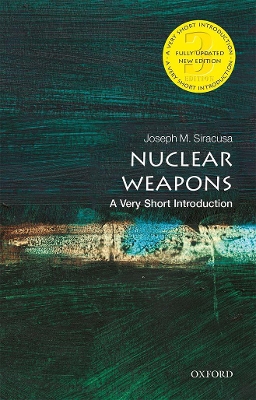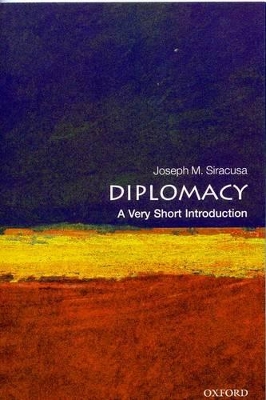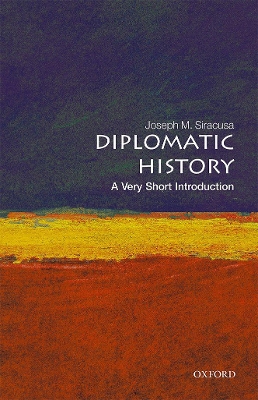Very Short Introductions
3 total works
Nuclear weapons have not been used in anger since the United States dropped atomic bombs on Hiroshima and Nagasaki in August 1945. Yet even after the Cold War, the Bomb is still the greatest threat facing humankind. As President Bill Clinton's first secretary of defence, Les Aspin, put it: 'The Cold War is over, the Soviet Union is no more. But the post-Cold War world is decidedly not post-nuclear'. For all the efforts to reduce nuclear stockpiles, the Bomb is here
to stay.
This Very Short Introduction looks at the science of nuclear weapons and how they differ from conventional weapons. Tracing the story of the nuclear bomb, Joseph Siracusa chronicles the race to acquire the H-bomb, a thermonuclear weapon with revolutionary implications; and the history of early arms control, nuclear deterrence, and non-proliferation. He also tracks the development of nuclear weapons from the origins of the Cold War in 1945 to the end of Moscow-dominated Communism in
1991, and examines the promise and prospect of missile defence, including Ronald Reagan's 'Star Wars' and George W. Bush's National Missile Defence. This third edition includes a new chapter on the development of nuclear weapons and the policies they have generated since the end of the Cold War.
ABOUT THE SERIES: The Very Short Introductions series from Oxford University Press contains hundreds of titles in almost every subject area. These pocket-sized books are the perfect way to get ahead in a new subject quickly. Our expert authors combine facts, analysis, perspective, new ideas, and enthusiasm to make interesting and challenging topics highly readable.
to stay.
This Very Short Introduction looks at the science of nuclear weapons and how they differ from conventional weapons. Tracing the story of the nuclear bomb, Joseph Siracusa chronicles the race to acquire the H-bomb, a thermonuclear weapon with revolutionary implications; and the history of early arms control, nuclear deterrence, and non-proliferation. He also tracks the development of nuclear weapons from the origins of the Cold War in 1945 to the end of Moscow-dominated Communism in
1991, and examines the promise and prospect of missile defence, including Ronald Reagan's 'Star Wars' and George W. Bush's National Missile Defence. This third edition includes a new chapter on the development of nuclear weapons and the policies they have generated since the end of the Cold War.
ABOUT THE SERIES: The Very Short Introductions series from Oxford University Press contains hundreds of titles in almost every subject area. These pocket-sized books are the perfect way to get ahead in a new subject quickly. Our expert authors combine facts, analysis, perspective, new ideas, and enthusiasm to make interesting and challenging topics highly readable.
Like making war, diplomacy has been around a very long time, at least since the Bronze Age. It was primitive by today's standards, there were few rules, but it was a recognizable form of diplomacy. Since then, diplomacy has evolved greatly, coming to mean different things, to different persons, at different times, ranging from the elegant to the inelegant. Whatever one's definition, few could doubt that the course and consequences of the major events of modern
international diplomacy have shaped and changed the global world in which we live. Joseph M. Siracusa introduces the subject of diplomacy from a historical perspective, providing examples from significant historical phases and episodes to illustrate the art of diplomacy in action.
ABOUT THE SERIES: The Very Short Introductions series from Oxford University Press contains hundreds of titles in almost every subject area. These pocket-sized books are the perfect way to get ahead in a new subject quickly. Our expert authors combine facts, analysis, perspective, new ideas, and enthusiasm to make interesting and challenging topics highly readable.
international diplomacy have shaped and changed the global world in which we live. Joseph M. Siracusa introduces the subject of diplomacy from a historical perspective, providing examples from significant historical phases and episodes to illustrate the art of diplomacy in action.
ABOUT THE SERIES: The Very Short Introductions series from Oxford University Press contains hundreds of titles in almost every subject area. These pocket-sized books are the perfect way to get ahead in a new subject quickly. Our expert authors combine facts, analysis, perspective, new ideas, and enthusiasm to make interesting and challenging topics highly readable.
Diplomatic history explores the management of relations between nation-states by the process of negotiations. From the diplomacy of the American Revolution, the diplomatic origins of the Great War and its aftermath, Versailles, and the personal summitry behind the night Stalin and Churchill Divided Europe, to George W. Bush and the Iraq War, and diplomacy in the age of globalization, the management of power relationships has had an immense impact on our recent
history.
This Very Short Introduction updates the former Diplomacy: A Very Short Introduction and illustrates international diplomacy in action, exploring the changes in method at key historical junctures, and highlighting the very different demands that circumstances make on the practice of diplomats. Drawing on the case studies above, it makes sense of the way in which skilful diplomacy, as well as hubris, rashness, and excessive caution, can have important ramifications for the fate
of nations. Based on the experiences of diplomatic history, it also locates the universal role of negotiations and identifies the key elements of success. As Joseph M. Siracusa shows, diplomacy was and is an indispensable element of statecraft, and without skilful diplomacy political success may remain elusive.
Very Short Introductions: Brilliant, Sharp, Inspiring
ABOUT THE SERIES: The Very Short Introductions series from Oxford University Press contains hundreds of titles in almost every subject area. These pocket-sized books are the perfect way to get ahead in a new subject quickly. Our expert authors combine facts, analysis, perspective, new ideas, and enthusiasm to make interesting and challenging topics highly readable.
history.
This Very Short Introduction updates the former Diplomacy: A Very Short Introduction and illustrates international diplomacy in action, exploring the changes in method at key historical junctures, and highlighting the very different demands that circumstances make on the practice of diplomats. Drawing on the case studies above, it makes sense of the way in which skilful diplomacy, as well as hubris, rashness, and excessive caution, can have important ramifications for the fate
of nations. Based on the experiences of diplomatic history, it also locates the universal role of negotiations and identifies the key elements of success. As Joseph M. Siracusa shows, diplomacy was and is an indispensable element of statecraft, and without skilful diplomacy political success may remain elusive.
Very Short Introductions: Brilliant, Sharp, Inspiring
ABOUT THE SERIES: The Very Short Introductions series from Oxford University Press contains hundreds of titles in almost every subject area. These pocket-sized books are the perfect way to get ahead in a new subject quickly. Our expert authors combine facts, analysis, perspective, new ideas, and enthusiasm to make interesting and challenging topics highly readable.


